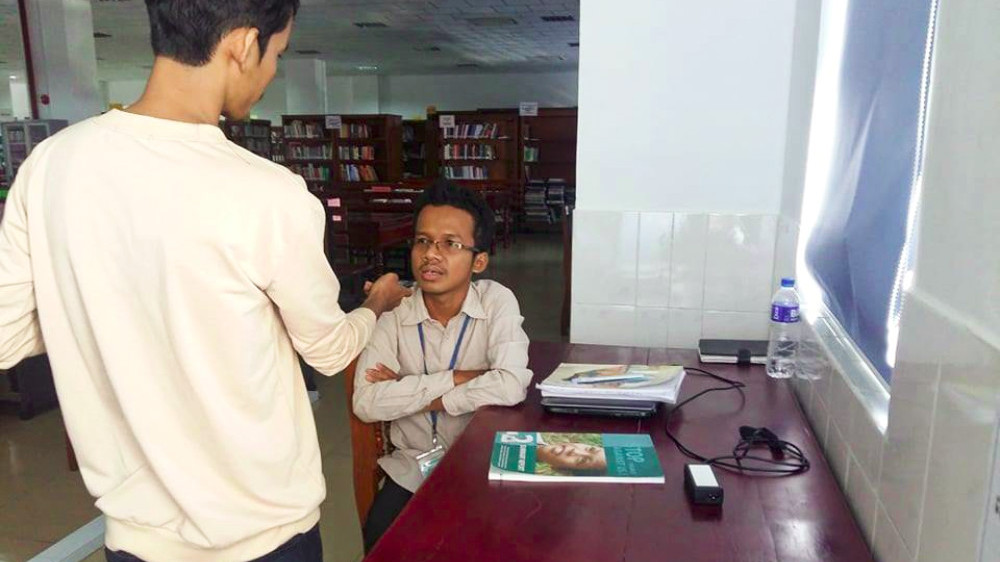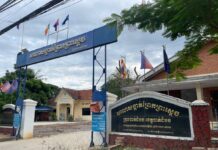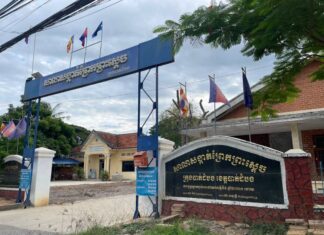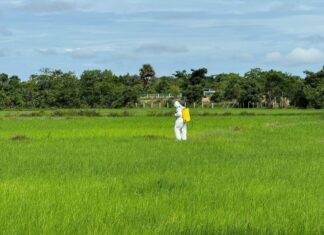Survivors of the Khmer Rouge regime know well the importance of “Brother No. 2” Nuon Chea. However, for many young Cambodians, Chea — who died last month — appears to be on the path to being forgotten.
Reporters interviewed several university students in Phnom Penh last week, most of whom said they heard the name of Chea but didn’t know his position or significance.
Seng Sodaled, a 21-year-old student at the Royal University of Phnom Penh (RUPP), said she knows some information about Chea from her mother, school and visiting the Tuol Sleng Genocide Museum, and thinks it is very important to remember him.
“But I do not know exactly who he is and his position and history because I am busy studying,” Sodaled said.
Chom Rern Sokunthavry, a 20-year-old student at RUPP, also said she knows only a little.
“I don’t understand it well because I am busy studying a lot. I think it is so important that Cambodian people should know more about the history of leaders in the past,” she said.
Da Ny, a 19-year-old student at the University of Health Sciences, said she knows about the Khmer Rouge but not clearly. She has gotten her information mostly from school, TV and radio.
“I only know the name of Nuon Chea but [I’m] not clear about that. I know some about the Khmer Rouge and the names of Pol Pot and Nuon Chea, and I think I understand it because it is important. I know it from school before, but now I forgot some because I am busy with my studying,” she said.
Mao Piseth, 22, a student of international business at the University of Cambodia (UC), said Chea was only one of many Khmer Rouge leaders.
“Nuon Chea’s death affected Cambodian victims only a little because there were many leaders in the Khmer Rouge,” Piseth said.
Four other students interviewed also said they did not know a lot about Chea’s role in the Khmer Rouge.
Varma Bunly, a history teacher at RUPP, said all university students should know about the Khmer Rouge because universities need to teach students about the regime as part of Cambodian history for their foundation year.
However, not all students were interested in political history, Bunly said.
“They might be interested in entertainment news more than politics, and some of them know that Nuon Chea died but they do not know who Nuon Chea is,” he said.
Bunly said it is important that Chea’s history is remembered because he was a key leader in the regime.
“Chea is a historical figure because he was a top leader of Democratic Kampuchea,” he said.
A piece of history was lost when Chea died, he said.
“In losing Chea, it means we are losing an important witness in this regime … and most importantly losing a trace of history,” Bunly said.
In the past, Chea was often in the news because he was on trial at the Khmer Rouge Tribunal after his arrest in 2007.
Neth Pheaktra, spokesman for the Extraordinary Chambers in the Courts of Cambodia (ECCC), said 500,000 people have visited the tribunal and more than half have been youth and students.
About 300,000 students from various provinces and cities learned about the processes of the ECCC and the real information about the Khmer Rouge by visiting the center, Pheaktra said.
One of the roles of the tribunal was to make sure people remembered the tragedies of the Khmer Rouge years, he said.
“Remembering Cambodia’s [history] so leaders in the world do not kill people when they are in power,” he said.
Now, however, Chea is dead and most cases at the tribunal have finished.
Cheng Ratana, a Bophana Center officer for communications and cultural activities, said he was still not worried about Chea being forgotten because there were many ways to learn about the Khmer Rouge and Chea.
“The real history cannot change and his name is already written in history books,” Ratana said.
“We have a lot of sources that teach about the Khmer Rouge and Nuon Chea because he was a top leader in the past regime, and they can learn about the Khmer Rouge and Nuon Chea from books, documentary videos and history apps,” he said.
Chea was born on July 7, 1926 in Battambang province. During the Cambodian genocide of 1975-1979, Chea was the deputy secretary of the Communist Party of Kampuchea.
In 2014, Chea received a life sentence for crimes against humanity. Last year, he was also found guilty of genocide. He died last month at age 93 from disease.












